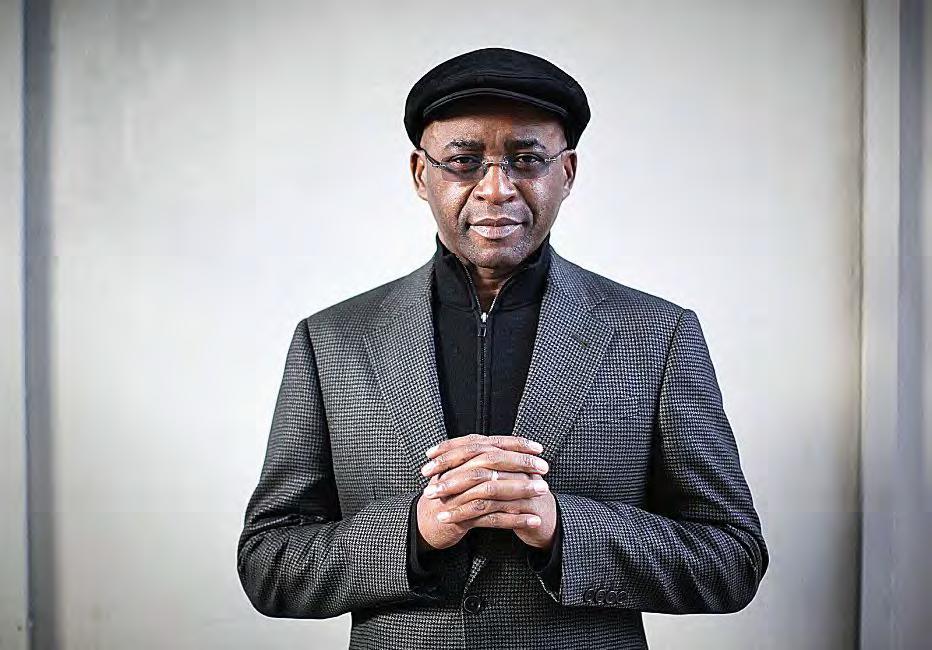
16 minute read
WIDE ANGLE / Akufo-Addo’s second-term test
Strive Masiyiwa: resurgent and raring to go
TELECOMS
Advertisement
Striving and thriving
Zimbabwe’s Econet is betting on Africa’s digital future with its huge fibre-optic network and new data centres. Yet another example of CEO Strive Masiyiwa bouncing back
C. BIBBY/FINANCIAL TIMES-REA
By OLIVIER MARBOT
Zimbabwean telecoms billionaire Strive Masiyiwa has not yet run out of ideas. He recently helped to raise more than $1bn to ensure the growth of his group, Econet. Masiyiwa, who celebrated his 60th birthday on 29 January and is well-known as a philanthropist, is also a member of the task force set up by the African Union to fight Covid-19 .
Masiyiwa is the only billionaire from Zimbabwe. For more than 30 years, he has been one of the main entrepreneurs leading the continent’s digital transformation. Famous for ending the state monopoly in Zimbabwe’s telecoms sector in the 1980s, the now London-based engineering graduate has, since his early days in business, shown an uncommon capacity to bounce back.
Masiyiwa quickly built an ecosystem around his Econet Group that extended beyond Zimbabwe’s borders and invested massively in South Africa. Subsidiaries spread from Botswana to Lesotho, from Rwanda to Nigeria and Burundi, and to other continents. Masiyiwa continued to believe in the idea of not sticking to one specialisation, of being one step ahead. The group launched itself into satellite, terrestrial and submarine cables, subscription television (Kwese TV – its biggest failure to date) and, more recently, data centres, which it describes as “a revolution that will mark a new era for the technology sector”.
No thanks from the motherland
Masiyiwa’s journey has not been without mistakes, and that is what makes it exciting. He won his 9 legal battle with the Zimbabwean authorities over opening up telecommunications to competition, but he paid a high price for it as he had to leave the country, where his relations Africa Data Centres in six countries will be open by 2025, with a with the political authorities re In 2019, the Harare authorities’ main tense. decision to combined power of ban the use of foreign currencies on their 54MW and 24,000m2 soil and to authorise only the Zimbabwean of white space dollar almost brought him to his knees.
EcoCash: mobile money for Zimbabweans
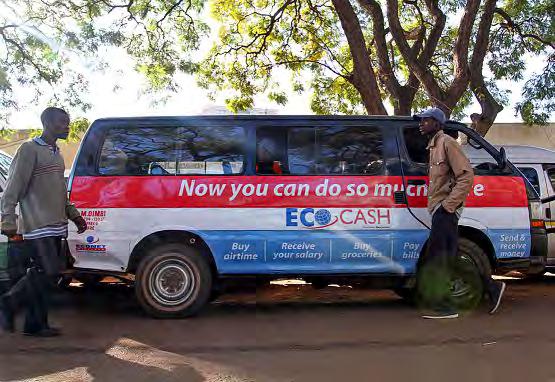
TAR TSVANGIRAYI MUKWAZHI FOR
(It also caused Econet, ranked 125th last year, to fall off this year’s Top 500).
Between market mistrust and inflation, the local currency lost 95% of its value and the businessman, whose assets are still listed in Zimbabwe, saw his wealth plummet. In a few months, his fortune fell from $2.3bn to $1.1bn. Weakened by the failure of Kwese TV, financed via a $375m loan, Masiyiwa had to sell 8% of Liquid Telecom for $180m to relieve his group’s cash flow.
The Covid-19 pandemic and the related economic crisis have come at the worst possible time for the Econet Group and its boss. However, it managed to resurge in spectacular fashion during 2020. Its subsidiary Liquid Telecom, renamed Liquid Intelligent Technologies, raised $840m on the markets in February 2021 to restructure its debt and continue its development. Managed by Nic Rudnick, it is now Africa’s leading fibre-optic operator, running a network of more than 70,000km of fibre-optic cables from Cape Town to Cairo, with a recent link to Moanda on the coast of DRC (see box).
At the end of 2020, another of its companies, Africa Data Centres (ADC), attracted the attention of the International Development Finance Corporation. The US institution, which supports investment in developing countries, invested $300m.
Control of African data
ADC, which already manages five data centres on the continent (in South Africa, Kenya and Togo) and is currently building one in Lagos, with plans to expand to other countries, is both promising and strategic. At a time when the supply of digital services – in particular cloud storage – is exploding on the continent, this is a decisive move. While the US has no intention of abandoning the field to Chinese companies, Africa itself must get involved if it hopes to retain control over the management of its data.
The billionaire’s impressive address book is no doubt a factor in his success. With former US president Barack Obama’s support, he has set up a programme to send young US citizens to work in his Africa-based companies at the beginning of their careers. He is also close to Chinese billionaire Jack Ma, to whom he helps open the doors of presidential palaces across the continent.
Connecting Congo
Kinshasa, Kikwit, Kananga, Moanda, Mwene-Ditu, Kolwezi, Lubumbashi... What do all of these cities have in common? They now have access to the 2,500km fibre-optic network laid by Liquid Intelligent Technologies (LIT) in the Democratic Republic of Congo.
This group, previously known as Liquid Telecom, is a subsidiary of the Zimbabwean group Econet Wireless, owned by Zimbabwean tycoon Strive Masiyiwa.
“Its new name confirms the strategic shift of the company, which has added IT and cybersecurity to telecommunications,” said LIT’s CEO for DRC, Michel Hebert, during a face-to-face meeting with the press in Kinshasa in March.
A second line is under construction. It will be 4,000km long and will link the central-southern part to eastern DRC. With these two lines, the DRC will become the 14th member country of the One Africa Network, which totals more than 73,000km of fibre optics on the continent, from Cape Town in South Africa to Dar-es-Salam in Tanzania, or to Lubumbashi in the DRC.
The communication infrastructure is legally the responsibility of the stateowned Société Congolaise des Postes et Télécommunications. However, the Congolese minister of post, telecommunications and new information and communication technologies, Augustin Kibassa, made it known at the inauguration of the new network that the government had granted a waiver to LIT to allow it to build the backbone of the network.
“The DRC has only 4,000km of network whereas the need is for 50,000km. We have made the choice to move the country forward,” said Kibassa.
With its 2.3m square kilometres and 90 million inhabitants, the DRC ranks only 145th in the world for internet access. It has a penetration rate of less than 50% for cellular telephony and an estimated 30% coverage across the country’s territory. LIT’s fibre-optic network is therefore a game changer.
By STANIS BUJAKERA TSHIAMALA
T H E P OW E R O F PAR T N E R S H I P I N A F R I C A
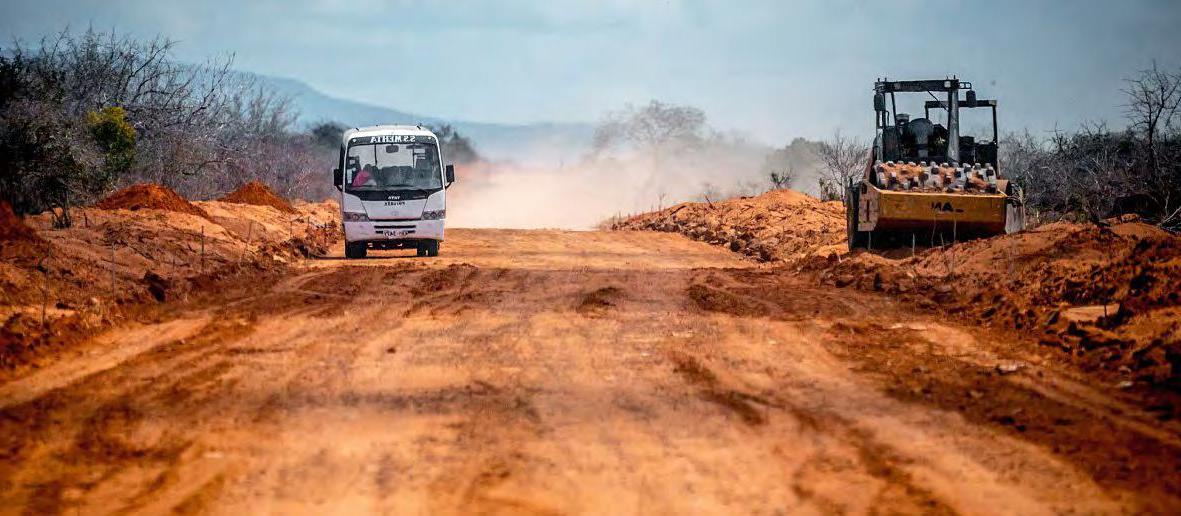
Celebrating 45 years of Success
The OPEC Fund for International Development (the OPEC Fund) is the only globally mandated development institution that provides financing from member countries to non-member countries exclusively. We work in cooperation with partner countries and the international development community to stimulate economic growth and social progress in low- and middleincome countries around the world. Our work is people-centered, focusing on projects that meet essential needs, such as food, energy, infrastructure, employment (particularly relating to SMEs), clean water and sanitation, healthcare and education. To date, the OPEC Fund has committed more than US$22 billion to development projects in over 125 countries –including 48 countries in Africa. Together we drive development, strengthen communities and empower people.
Connecting Kenya
The OPEC Fund dedicated US$12 million in financing towards upgrading Kenya’s Nuno-Mogodashe Road, which connects the towns of Garissa and Wajir, and to the North East region and neighboring Ethiopia and Somalia. The completed road has enhanced the population’s access to social services and eased travel to some of Kenya’s top tourist destinations, thus helping boost the tourism sector. Total project costs of US$78 million were co-financed with The Arab Bank for Economic Development in Africa, The Kuwait Fund for Arab Economic Development, the Saudi Fund for Development, the Abu Dhabi Fund for Development, and the Government of Kenya.
US$1.3bn finance facility for Ghana’s cocoa
The OPEC Fund contributed US$45 million to the major finance facility for Ghana Cocoa Board (Cocobod). Cocoa is one of the largest foreign exchange earners for Ghana and the cocoa industry is a major source of employment, with around 800,000 families active in cocoa farming. The pre-export facility provides a total of US$1.3 billion to finance the purchase of Ghana’s main and light cocoa crop for the 2020/21 season. The West African country is the second largest cocoa exporter worldwide with a 20 percent market share.
Boosting Cameroon’s Energy Capacity
The OPEC Fund provided EUR 50 million to Nachtigal Hydropower Company (NHPC) for the development, construction and operation of a 420 MW hydropower plant in Cameroon. The plant is expected to be the country’s largest generator of electricity, meeting about one-third of Cameroon’s electricity needs. The Nachtigal Project is being developed as a public private partnership by a joint venture between the International Finance Corporation (IFC), Electricité de France (EDF) and the government of Cameroon, with support from the World Bank Group.
Please visit us at opecfund.org
INTERVIEW
Ralph Mupita
The CEO of MTN talks about the company's plans for growth, which involve a ‘superapp’ and supporting the growth of e-commerce on the continent
Interview by QUENTIN VELLUET
Despite its loss to Kenya’s Safaricom in the May bidding round for a telecoms licence in Ethiopia, MTN (#5) has grand ambitions. The South African group hopes to grow its offer into a payments and communication ecosystem that rivals those of China’s WeChat or the US tech giants. This will require raising new funds from investors, taking on other rivals in Africa like Orange, and investing heavily in fibre-optic infrastructure. The firm’s CEO, Ralph Mupita, explains how MTN will exit from its Middle East markets, which have brought it an entanglement with the US Justice Department.
You chose to separate mobile money from your other operations? Why? RALPH MUPITA: Mobile money represented 46 million subscribers at the end of last year, 8% of group service revenue and $152bn of transaction value in our MoMo (Mobile Money) system. The business is expanding and we believe that a structural separation is needed going forward.
The second thing is that these businesses are actually very valuable. The current share price does not reflect the inherent value of the infrastructure or the platform assets of the fintech. We will create an opportunity, in due course, where investors can put money directly into this operation to reveal the value. So is the plan to have an initial public offering (IPO) for MoMo? We will pursue the avenue that best reveals the value. If it is through an IPO, then that is what we will focus on. Right now, we are not being prescriptive that the businesses need to be separately listed. You could have them unlisted and still revealing value. However, an IPO can also be the mechanism for this.
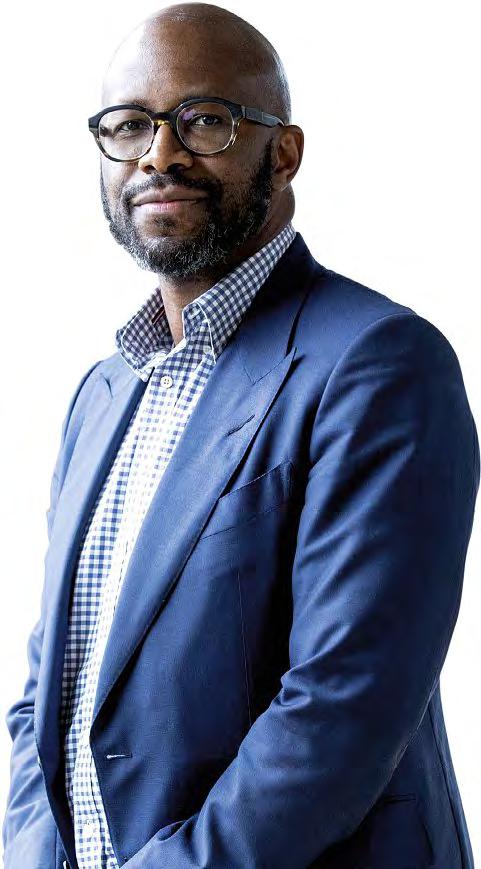
With the Ayoba app, you are in competition with the likes of Google and Facebook. How do you plan to compete with WhatsApp?
We have very bold ambitions with Ayoba. At the end of last year, we had 5.5 million monthly active users on the app. Over the medium term – three to five years – we will get to 100 million users. Ayoba is an African-developed app. We have taken cognisance of what we believe are the specific needs and requirements of our customer base, and where Africa is in terms of internet adoption. So, when we developed Ayoba we focused on factors that would make Ayoba unique compared to the other global instant messaging apps. One of them is recognition of the level of literacy on the continent, thus the need for local-language versions. Secondly, we created emojis that are relevant, centred on understanding local needs. Third, we acknowledged that a lot of the subscribers in our market still use
Towards sustainable energy for all
Our effort towards a just energy transition combines the need to reduce carbon footprint with the need for community development
The current economic and health crisis has heightened awareness of the strong interdependence between economic growth and the health of the natural and social environment, and also of the essential need to combine economic development with a careful management of natural resources and the generation of social value.
In this framework, Eni’s energy transition strategy aims at a significant reduction of the portfolio’s carbon footprint to be reached also through the contribution of gas, which in the long term will represent over 90% of our upstream sector. At the same time one of the fundamental objectives of our strategy is to enhance access to sustainable energy sources, promoting the use of locally produced natural gas in the transition to a low-carbon energy mix.
Fighting energy poverty
Ensuring universal access to energy in an efficient and sustainable manner – UN Sustainable Development Goal n. 7 - is the main challenge for the energy sector in the transition process towards a low-carbon future. It is also a driver to meet the primary needs related to education, health and economic diversification. This is especially true in Africa, where 600M people still lack access to energy. Eni contributes to this challenge in many ways. In many countries of operations including Algeria, the Republic of Congo, Ghana, and Egypt, 100% of the gas we produce is destined for local markets, and to fuel local power plants. In other countries, Eni invests in the construction of infrastructure for the production and transport of gas both for export, and for local consumption. These initiatives are fundamental to fight energy poverty and meet the primary energy needs. Strengthening African power systems
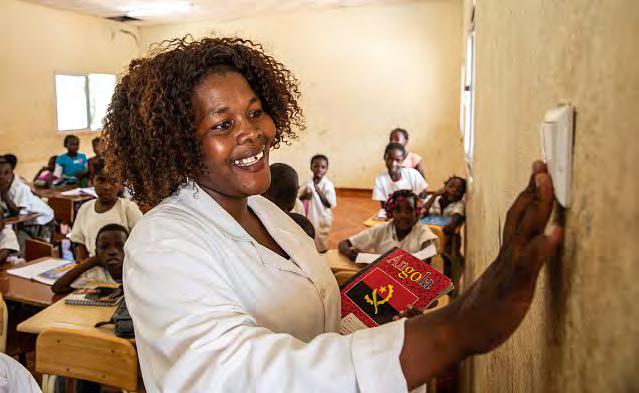
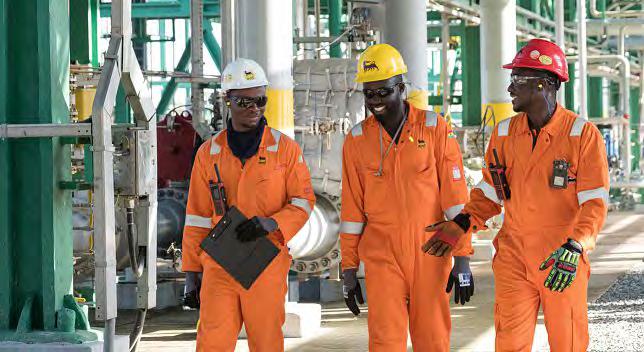
In Ghana, Eni is operator of the Offshore Cape Three Points project (OCTP), the only non-associated gas project destined for the domestic market in Sub-Saharan Africa, which since 2018 has been feeding the Country’s power plants with a reliable, stable and sustainable energy source. In addition, Eni completed the Takoradi-Tema Interconnection Project in 2020, which transports gas from the Western Region to the eastern part of the Country, while continuing to transport gas from Nigeria to Benin, Togo and Ghana. Thanks to this, in 2020, 98% of Ghana’s thermal power was generated by gas, more than 50% of which came from the OCTP project. These projects meet Ghana’s growing energy demands and reinforce Eni’s commitment to fostering employment, local training and sourcing goods and services from local suppliers.
2G phones. When you send a message on Ayoba from your smartphone to someone who has a 2G handset, it is delivered as an SMS.
Are you following WeChat’s strategy with Ayoba? Yes. Over time, we are looking to integrate mobile money into Ayoba. We have a huge mobile-money base with which to try and create a composite of the two – a bit of a WeChat recap. We want to create an ecosystem of merchants where mobile commerce can take place.
To be successful in creating this type of architecture for services and channels on Ayoba and link it to mobile money, we will create a mobile commerce system that can accelerate the growth of the app and enhance that through the concept of a WeChat for Africa.
You say that you want to make selective acquisitions or mergers until 2025. What markets are you targeting? The selective mergers and acquisitions we are considering are those that “move the needle”: ones that can change the profile of the group as it is today, with a five-to-10-year horizon of growth. An example that would tick that box for us is to access opportunities in Ethiopia. The country is a “‘needle mover”’ because we acknowledge the need to build the business for the long term. Today, Ethiopia represents probably one of the largest single-growth opportunities in Africa.
MTN plans to invest $500m in fibre. Which markets will be prioritised? Internet adoption in Africa is at a very early stage, and, as the technology curve moves to 5G, we will see that even at a more nascent level. Data is what will underpin growth across markets in this continent. There is an incremental investment that will come in the near future, at least $1bn. We believe that $500m is what we would need to put in and we are very comfortable with that. At MTN, we largely do self-provision of fibre and very little is required from third parties. Going forward, the right model is an open-access one. We have the ability, within fibre, to sell some of our capacity to third parties at a commercially-agreed pricing.
So you’re not particularly engaged in developing the fibre to the home? There is the “own the home” opportunity, but fibre will actually be a fairly small part of that. There will be some interesting technologies that get us to own the home, such as fixed wireless access. However, we plan to get at least 10m homes across the African markets over the next three to five years. A large part of that will be in Nigeria, Ghana and South Africa.
ENGINEERING OPPORTUNITIES
1972 Born in Zimbabwe Early 1990s Civil Engineering degree at the University of Cape Town
1996-1999 Worked as an engineer at Haw & Inglis 2000 MBA at UCT 2001 Joined Old Mutual South Africa 2012 Became CEO for Emerging Markets at Old Mutual 2017 Appointed Chief Financial Officer at MTN Sept. 2020 Appointed Group CEO of MTN
Will the current legal troubles with US courts [over alleged payment of protection money to militant Islamic groups in Afghanistan] slow down the sale or impact the value of your Middle East businesses? We are very cognisant of the issues that we are dealing with in the Afghanistan matter in the US courts. They are not directly impacting how we are looking to exit either Syria, Yemen or Afghanistan. We are independently looking to exit the Middle East in a very orderly manner within the near to medium term. Our strategy is two pronged: first, we look to exit the consolidated subsidiaries – Syria, Yemen and Afghanistan –and then, over time, the Iran project. The latter will take more time as it is where there is a major store of value: it is a significant business and we will continue to engage with our partners there to develop and then exit.
You are now the sole leader of MTN [after the end of the transition period with Rob Shuter in March 2021]. How would you define your your role? I’m super excited about the prospects for MTN to deliver on the growth potential that we see in Africa, as well as to unlock value that we believe is embedded in MTN group in particular. As usual, there will always be challenges. We are not starry-eyed, we are realists; but you know, what gets us up in the morning is a sense that we can make a difference in Africa’s progress.
Africa has got a very unique opportunity to leapfrog industrially and economically by leveraging digital technologies. A lot of people say that 5G is only for the developed markets; but the counter view is that, when properly scrutinised, it has the ability to increase industrial capacity for Africa and economic growth.








